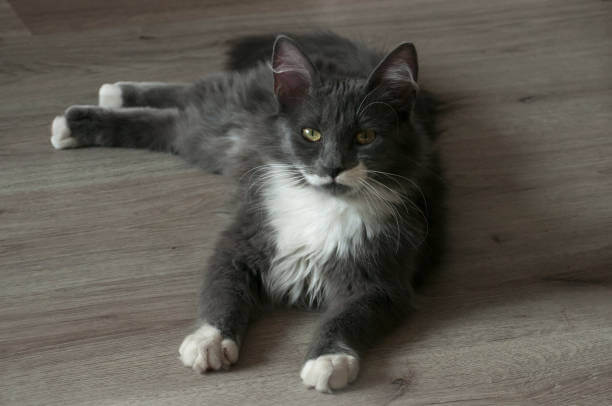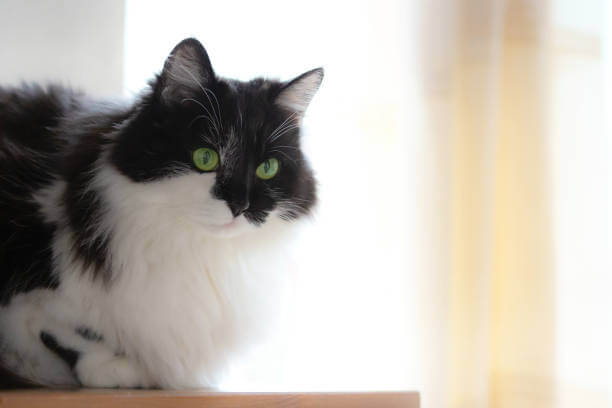If you’re a cat lover who suffers from allergies, you may have heard about the Maine Coon Cats breed and wondered if they are hypoallergenic. With their majestic appearance and friendly nature, Maine Coon cats have captivated the hearts of many. But can these beautiful creatures coexist harmoniously with allergy sufferers? In this article, we will explore the hypoallergenic properties of Maine Coon cats, shedding light on whether they are a suitable choice for individuals with allergies. So, let’s dive in and uncover the truth about Maine Coon cats and allergies.

Understanding Allergies to Cats
Before delving into whether Maine Coon cats are hypoallergenic, it’s important to understand what causes allergies in the first place. Most cat allergies stem from a specific protein called Fel d 1, which is primarily found in a cat’s saliva, urine, and dander (dead skin cells that cats shed). When a person with allergies comes into contact with these allergens, their immune system reacts by producing histamines, leading to allergic symptoms such as sneezing, itching, and watery eyes.
The Myth of Hypoallergenic Cats
While the term “hypoallergenic” is often associated with certain dog breeds that produce fewer allergens or shed less fur, it is more challenging to apply this label to cats. Unlike dogs that primarily produce allergens through their skin and saliva, cats also deposit allergens through their dander. This makes it nearly impossible for any cat breed to be completely hypoallergenic.
Shedding and Dander: What Sets Maine Coons Apart
Maine Coons have gained some reputation for being more tolerable for individuals with allergies compared to other cat breeds. Although they do produce allergens like all felines, several factors make them stand out when it comes to allergies:
Reduced Allergenic Proteins
While Maine Coons do produce the Fel d 1 protein responsible for most cat allergies, some studies suggest that their levels might be lower compared to other breeds. This slight reduction in allergenic proteins may result in milder allergic reactions for some individuals.
Less Dander Production
One reason why Maine Coons are often considered more hypoallergenic is their tendency to produce less dander compared to other cats. The reduced dander production can potentially decrease the overall allergen load in the environment, making it easier for allergy sufferers to coexist with these majestic felines.
Regular Grooming and Maintenance
Maine Coons have a thick, luxurious coat that requires regular grooming to prevent matting and excessive shedding. By regularly brushing your Maine Coon, you can help remove loose hair and dander before they become airborne allergens. Additionally, frequent bathing can further reduce the amount of allergens present on their fur.
Managing Allergies: Tips for Living with Maine Coon Cats
While Maine Coon cats may be more tolerable for individuals with allergies, it’s essential to keep in mind that everyone’s sensitivity varies. If you’re considering bringing a Maine Coon into your home but have allergies, here are some tips to help manage your symptoms:
Regular Cleaning
Maintain a clean living environment by frequently vacuuming carpets, rugs, and furniture using a vacuum cleaner equipped with a HEPA filter. This will help minimize the accumulation of cat hair and dander around your home.
Designated Cat-free Zones
Consider creating designated cat-free zones within your home where you can retreat when your allergies flare up. This could be your bedroom or any other area where you spend significant amounts of time.
Air Purification
Investing in an air purifier fitted with a HEPA filter can significantly reduce airborne allergens like cat dander. Place the purifier in rooms where you and your Maine Coon spend the most time, such as the living room or your bedroom.
Consultation with an Allergist
If you’re seriously considering getting a Maine Coon but have severe allergies, it’s advisable to consult with an allergist before making a decision. They can perform specific tests to determine your sensitivity to cat allergens and provide personalized advice on how to manage your allergies effectively.
10Ways to Minimize Cat Allergies in Your Home
The decision to get a Maine Coon should never be taken lightly, especially for individuals with allergies. With the proper knowledge and preparation, it’s possible to create an allergen-free environment that allows you and your furry companion to coexist peacefully. To help minimize cat allergies in your home, here are some additional tips:
- Groom your Maine Coon regularly to reduce shedding and dander production.
- Vacuum frequently using a vacuum cleaner equipped with a HEPA filter.
- Wash your hands after playing with or petting your cat, as this can reduce exposure to allergens.
- Use mattress and pillow covers made from hypoallergenic materials.
- Avoid using carpeting and upholstered furniture to minimize the accumulation of allergens.
- Invest in an air purifier with a HEPA filter to reduce airborne allergens.
- Clean your cat’s litter box regularly to reduce allergen exposure when scooping the litter.
- Designate cat-free zones within your home to give yourself and your allergies a break.
- Use an air conditioner to maintain humidity levels below 50% and discourage dust mites from breeding in the environment.
- Consider consulting with an allergist for personalized advice on how to manage your allergies effectively.

Maine Coon Allergies
Ultimately, the decision to get a Maine Coon should be made after careful deliberation and consideration. Although these majestic felines may not be completely hypoallergenic, they do produce fewer allergens than other breeds and are generally more tolerable for individuals with allergies. By following the tips outlined in this article, you can create an allergen-free environment that allows you and your furry companion to coexist peacefully. After all, Maine Coons are known for their intelligence, loyalty, and love for their human families—qualities that make them the perfect addition to any home.
By providing a loving home and excellent care, you can ensure that your Maine Coon will be a source of joy for years to come. With the proper knowledge and preparation, it’s possible to create a home filled with laughter and cuddles that your Maine Coon will cherish for life. No matter what breed you decide to bring into your home, remember that cats are wonderful companions that require love and attention to thrive.
FAQS
Q: Do Maine Coons cause allergies?
A: Maine Coons do produce allergens like all cats, but some studies suggest that their levels might be lower compared to other breeds. This could potentially result in milder allergic reactions for some individuals. However, everyone’s sensitivity varies and it’s important to consult with an allergist if you’re considering getting a Maine Co
Q: Do Maine Coon cats produce less allergens than other breeds?
A: Studies suggest that Maine Coons may produce lower levels of the Fel d 1 protein responsible for most cat allergies, resulting in milder allergic reactions for some individuals. Additionally, they tend to produce less dander than other breeds, which can further reduce the allergen load in the environment.
Q: What measures can I take to minimize cat allergies in my home?
A: To minimize cat allergies in your home, it’sessential to groom your Maine Coon regularly, vacuum frequently, and invest in an air purifier with a HEPA filter. Additionally, it’s advisable to create designated cat-free zones within your home where you can take refuge when your allergies flare up.
Q: What are the benefits of getting a Maine Coon?
A: Maine Coons are known for their intelligence, loyalty, and love for their human families. These majestic felines make excellent companions and can bring joy to any home. Plus, they do not require a lot of grooming or special care—just regular brushing and regular veterinary check-ups should suffice.
Conclusion
Maine Coons are beloved felines that bring joy and companionship to any home. While they do produce allergens like all cats, their levels may be lower than those of other breeds. By taking precautions such as cleaning regularly, investing in an air purifier with a HEPA filter, and consulting with an allergist, it’s possible to create an allergen-free environment that allows you and your furry companion to coexist peacefully. With the proper knowledge and preparation, you can ensure that your Maine Coon will be a source of joy for years to come.
No matter what breed of cat you decide to bring into your home, remember that cats are wonderful companions that require love and attention to thrive. By providing a loving home and excellent care, you can ensure that your cat will be a source of joy for years to come.
